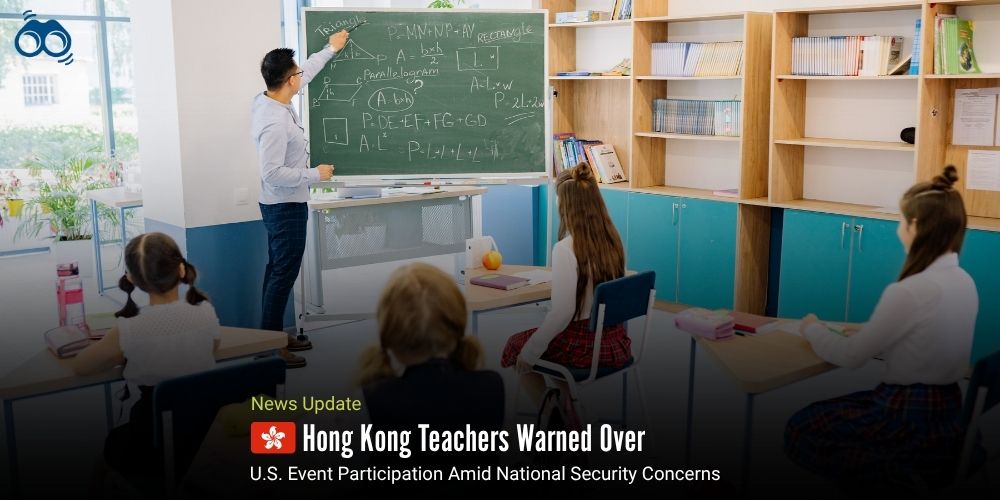Teachers Told to Report Embassy Invitations as Scrutiny Over Political Neutrality Intensifies
Hong Kong Schools Urged to Monitor Staff Engagement in Foreign Events
In a development that reflects mounting sensitivities around political expression in Hong Kong, teachers have reportedly been cautioned against attending events related to U.S. Independence Day. According to several educators, a message allegedly issued by a school principal cited guidance from the Education Bureau’s regional office, advising staff that participation in activities organised by the U.S. Consulate in Hong Kong could be seen as contravening local laws, including the national security law. The message reportedly urged teachers to exercise discretion and refrain from engaging in such events, amid concerns that their involvement might be interpreted as political. This advisory comes in the context of heightened scrutiny over public conduct by educators and civil servants, who have faced increasing pressure under legislative reforms introduced since 2020.
Further concern was raised through a post on the Facebook page Edu Lancet, run by former Hong Kong Examinations and Assessment Authority official Hans Yeung. The post encouraged teachers to dissuade students from attending U.S. Independence Day gatherings and to prioritise their safety if they expressed interest. Additionally, an email, also posted on Edu Lancet and verified by The Guardian, purportedly instructed school staff to report any invitations from embassies to the school principal and to seek prior approval, citing national security implications.
While the Hong Kong Education Bureau neither confirmed nor denied the content of the messages, it stated that schools are expected to prevent activities that may threaten national security. It emphasised that staff and students should be made aware of such risks, with schools implementing internal strategies aligned with official guidelines. However, the Bureau reportedly did not clarify which specific laws might be breached by attending U.S. Independence Day events, nor whether the warning was limited to this particular occasion. The U.S. Consulate in Hong Kong was said to have been approached for comment.
The Facebook page Edu Lancet, previously criticised by the government for its critical stance on educational policies, remains a platform of contention. Security Secretary Chris Tang has reportedly accused Yeung, now based in the UK, of incitement, adding to tensions surrounding the platform. Observers have interpreted these warnings as indicative of broader limitations introduced into Hong Kong’s education system following the 2019 pro-democracy protests. In response to the unrest, Beijing implemented the national security law in 2020, which criminalised dissent and triggered sweeping educational reforms. That same year, then-Chief Executive Carrie Lam reportedly attributed the protests in part to the local education system, thereby initiating an overhaul that continues to unfold.
Since then, authorities have revised school curricula to integrate national security education across subjects, including English, music, mathematics, and physical education, while reinforcing a stronger emphasis on patriotic values. Moreover, the government has reportedly banned materials it considers a threat to national security, including, notably, a children’s picture book about sheep published by the city’s physiotherapists’ union. In certain instances, authors have even faced prosecution.
Educators have reportedly expressed unease, citing a growing need to self-censor for fear of being perceived as unpatriotic. As of the 2023–24 academic year, all new teachers appointed to public schools, Direct Subsidy Scheme schools, and kindergartens are required to pass an examination on Hong Kong’s Basic Law and national security law. Education Minister Christine Choi has consistently warned against forms of “soft resistance” in schools and has urged staff to remain vigilant against “hostile forces” that might infiltrate the education system through extracurricular events or seemingly innocuous reading materials. This sequence of developments highlights the increasingly narrow space for civic engagement and professional autonomy within Hong Kong’s education system.
Editor’s Note:
The warnings issued to teachers in Hong Kong regarding attendance at U.S. Independence Day events elicit considerable apprehension concerning the expanding scope of restrictions on both professional and private spheres. While national security undeniably constitutes a significant imperative, compelling educators to abstain from non-political, international gatherings, particularly in the absence of explicit legal justification, establishes a disquieting precedent. Educators bear the crucial responsibility of cultivating the ensuing generation. They ought to be incentivised to explore global viewpoints and cultivate receptiveness, rather than being placed in circumstances where participation in cultural exchange appears hazardous. The escalating compulsion toward self-censorship, coupled with imprecise delineations, merely exacerbates the uncertainty within educational institutions already contending with pervasive reforms.
Skoobuzz firmly believes that National pride and global engagement are not mutually exclusive; indeed, they can and should coexist. However, for such coexistence to materialise, educators must be afforded trust, rather than merely subjected to surveillance.














0 Comments (Please Login To Continue)